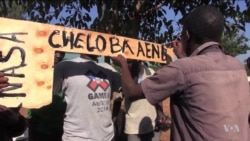Kenya's opposition has suspended protests following deadly unrest Monday as the country struggles to finalize a seemingly never-ending presidential election. As tensions rise, some see traces of the decades-long rivalry between two of Kenya's top political families coming to the fore.
The clash between President Uhuru Kenyatta and opposition leader Raila Odinga echoes that of their fathers, who were the country's first president and vice president following independence in 1963.
"During those early '60s, there was a big rivalry between the west and the east," explained Wilber Otichilo, the governor of Kenya's Vihiga County. "And that's now how the two became rivals. And after one year of [Odinga] being vice president, Jomo Kenyatta fired Jaramogi Odinga from his government. And that's how he formed the opposition."
The two men disagreed on general ideology, and on resource and land allocation issues — much like their sons do now. However, University of Nairobi lecturer Herman Manyora cautions against oversimplification.
"There's something in you, perhaps as a human being, that you say, 'Well, I will fight the wars of my father. I will complete what my father started.' You could look at it that way," he said. "But … I see beyond that myself, because there is a clear dichotomy in the arrangement of our politics and our economics and everything else in this country."
Since independence, no one from outside Kenya's Rift Valley or Central province has ruled the country, feeding a sense of marginalization in the west, Odinga's home region. That has been exacerbated by Odinga's contested defeats in the past three elections.
Opposition supporter Zeblon Oloo, who works as a mechanic in Kakamega County, feels that separation.
"Since independence, we were under Mr. Jomo Kenyatta. He rules for 15 years. Then Moi took [over], he rules for 24 years. After that, Mr. Kibaki took [over]. He rules 10 years. After that, Mr. Uhuru [Kenyatta] has taken. Now it's five years. Now from there, there is not anything we have developed between western Kenya. We are down," he said.
There is more to Kenyan politics than familial rivalry. Odinga has dominated the opposition for decades, while Uhuru Kenyatta, a man 17 years his junior, only became interested in politics in the early 2000s. Previously, Odinga even supported candidates from Kenyatta's Kikuyu ethnic group, including his former rival Mwai Kibaki.
Now some politicians in the west, such as former Vihiga County governor Moses Akaranga, are switching sides, backing Kenyatta for the October 26 repeat election.
"Many Kenyans … feel that if now we vote for Uhuru Kenyatta, he will finish his term completely and go home," Akaranga said. "So, the Kenyatta dynasty will have gone. Raila [Odinga] will not make it again because of his age. So, the Jaramogi Odinga's dynasty also will have gone. So, the Kenyatta and the Jaramogi will leave Kenyans to choose, or elect a leader from another dynasty."
For now, however, Kenyans wait for the next developments in an election season that has been anything but ordinary.






